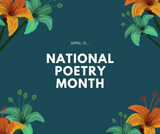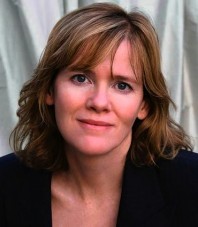 After years of writing for television shows like Ellen, Mad About You, and the cult favorite Arrested Development, Maria Semple turned her focus to fiction. Her first novel, This One Is Mine, was an Indie Next pick and received rave reviews across the country, from the New York Observer to the Seattle Post-Intelligencer. Her second novel, Where’d You Go, Bernadette, has caught the attention of even more media, including Time Magazine and The New York Times, which called the book a “fantastic, funny novel.” Seattleites, in particular, will relate to the novel, as it pokes fun of many of the, um, quirks of the Emerald City. To get a feel of what you’re getting into with Where’d You Go, Bernadette, check out Semple’s trailer for the book. Those of you familiar with Seattle may also recognize some faces and places. Semple’s been on a lengthy tour for the book, but was kind enough to take time to answer some questions.
After years of writing for television shows like Ellen, Mad About You, and the cult favorite Arrested Development, Maria Semple turned her focus to fiction. Her first novel, This One Is Mine, was an Indie Next pick and received rave reviews across the country, from the New York Observer to the Seattle Post-Intelligencer. Her second novel, Where’d You Go, Bernadette, has caught the attention of even more media, including Time Magazine and The New York Times, which called the book a “fantastic, funny novel.” Seattleites, in particular, will relate to the novel, as it pokes fun of many of the, um, quirks of the Emerald City. To get a feel of what you’re getting into with Where’d You Go, Bernadette, check out Semple’s trailer for the book. Those of you familiar with Seattle may also recognize some faces and places. Semple’s been on a lengthy tour for the book, but was kind enough to take time to answer some questions.
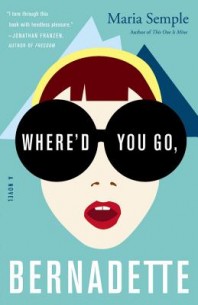
“Achingly funny and perfectly timed . . . Semple has a big heart, and possesses that rare ability to skewer, dissect and empathize with her targets, all at the same time . . . Read BERNADETTE, laugh loud and long, then take a good look in the mirror.”—Mary Ann Gwinn, The Seattle Times
LM: Early on in Where’d You Go, Bernadette, the title’s namesake rants about Seattle, then later on in the book raves about the city. My coworkers and I were laughing at some of the things she brings up about Seattle. The one I loved, in particular, was when she brought up how everyone must sneeze into their elbows, rather than their hands. Do you think you’re more of a lover or a hater of Seattle? If you’re leaning toward the latter, but hesitant to say it, just know that I am not a big fan of Seattle. There, I said it.
MS: Like Bernadette, when I first moved to Seattle, I couldn’t stand it. The street grid, the architecture, the native plants, the people. Shortly after we arrived, I went to the post office to mail a package. I had to write my return address on a slip and just seeing “Maria Semple, Seattle, WA” on the “From” line, was enough to make me start crying at the window. I never hated Seattle as much as Bernadette did, but as I sat down to write the book, I was gaining a perspective on my true feelings. I realized that my real issue wasn’t Seattle’s five-way intersections. It was that I was depressed about the low sales of my first novel. This had left me feeling so ashamed and creatively paralyzed that I didn’t think I’d ever write again. Instead of bouncing back after disappointment, I blamed Seattle. So that’s where I started with Bernadette’s character. Like me, she learned to take responsibility for herself and, in the process, acknowledge that Seattle may possess certain charms.
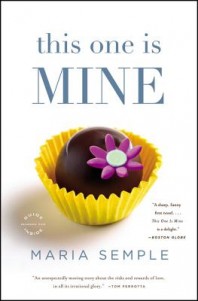 LM: That’s quite a perspective to gain from writing a novel. You wrote it as part epistolary and part narrative. If you had to do it all over again, would you write another novel in that style?
LM: That’s quite a perspective to gain from writing a novel. You wrote it as part epistolary and part narrative. If you had to do it all over again, would you write another novel in that style?
MS: Where’d You Go, Bernadette wanted to be written in that style. And while it was a ton of fun, I don’t think I’ll necessarily sit down next, roll up my sleeves and say, ‘OK, what will my next epistolary novel be about?’ I’m thinking that my next novel, like Where’d You Go, Bernadette, will come out of some kind of personal pain. A character or two will emerge and they will let me know if I’ll be writing in the first person, third person or some kind of pastiche.
LM: You’ve written for Ellen and Arrested Development, among other TV shows. How do you approach writing for television versus writing a novel? Do you struggle with one form more than the other?
MS: Writing two novels has taught me the joys of solitude and being able to nap on demand. I can never go back to TV now! That said, I learned so much from TV writing: dialogue, character, pacing, how to craft a scene. Ultimately both kinds of writing require you to be a creative problem solver. In TV the problems are much more concrete: budget, actors, network notes, schedule, set limitations, 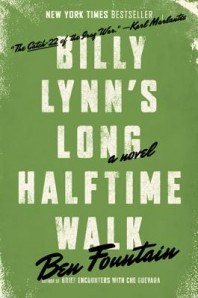 etc. In fiction, you’re trying to solve other types of problems like voice, point of view, pacing, how many characters, that kind of thing. TV was fun, and I was good enough at it, but having to come up with a joke on the spot was never anything I was great at, and something that I still have nightmares about.
etc. In fiction, you’re trying to solve other types of problems like voice, point of view, pacing, how many characters, that kind of thing. TV was fun, and I was good enough at it, but having to come up with a joke on the spot was never anything I was great at, and something that I still have nightmares about.
LM: How do you know when you’ve written something that is good?
MS: Hey, that’s a good question. I’ve never thought about that. But I do remember that when I wrote the parts of Bernadette I’m especially proud of, they all shared the same crackling energy. And this energy triggered a ton of other ideas. When I’m in that manic state, my mind a rapid fire of possibilities, so many that I can’t keep track of them, that means I’m onto something.
LM: You went on a pretty substantial tour for Where’d You Go, Bernadette. Did you have any interesting or wacky customer experiences?
MS: At my first reading in Seattle, at Elliott Bay Books, I talked about how difficult the transition was for me when I first moved to Seattle. A piece had just come out in The New York Times about me and my Seattle-bashing novel. At my readings, I usually read from the beginning of the book so I don’t give too much away. And that’s some of the harshest stuff about Seattle. So afterwards, while I was signing books, an old lady came up to me. She said, ‘I’ve lived here my whole life and I love it. If you hate it so much, why don’t you just stop complaining and leave?’ I said, ‘Because all my shit is here.’ I couldn’t believe it came out of my mouth like that, but it was the simple truth. She threw her head back and laughed and said, ‘You’re very funny. You can stay.’
LM: I think if an old lady not only compliments your humor, but also tells you that you can stay in Seattle, that means you’ve made it.
MS: Ha! I totally agree.
LM: So what are you currently reading?
MS: Billy Lynn’s Long Halftime Walk by Ben Fountain. It’s the best book of the year. I resisted reading it because of the subject matter. I’m a chick and I like novels about marriages and families. A story about a group of soldiers on leave from Iraq seemed like the last thing that would hold my interest. But my God, the book is brilliant! It’s marvelously funny, full of great scenes, some of the funniest dialogue I’ve ever read, plus it’s got real heart. If there’s one thing I want to use my interviews and personal appearances for now, it’s to get women to read that book.
LM: You are the third author I’ve interviewed who’s recommended that book! Jess Walter and Jonathan Evison also recommended it. I’ve avoided it for pretty much the same reason that you did. I guess I have to jump on that bandwagon now.
MS: Come on, Lindsey, there’s plenty of room.
LM: Don’t mind if I do.
Lindsey McGuirk is Village Books’ Digital Marketing & Publishing Coordinator. She also handles the store’s online marketing and works with authors to get their books published on the print-on-demand Espresso Book Machine.


